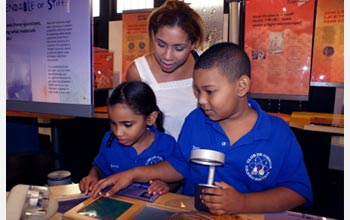News Release 09-003
Learning Science in Informal Environments
New report from National Research Council examines science learning outside of school

A family experiences the Strange Matter Exhibit at the Casa Roig Museum in Puerto Rico.
January 14, 2009
This material is available primarily for archival purposes. Telephone numbers or other contact information may be out of date; please see current contact information at media contacts.
Anyone who has visited a science museum, gone on a nature walk, or watched a science program on public television knows that one need not be in a classroom or lecture hall to learn about science. Indeed, opportunities to be immersed in science present themselves to people of all ages, backgrounds and abilities, in a myriad of locations.
Through its Informal Science Education program, the National Science Foundation (NSF) has funded these kinds of learning opportunities for decades. The field of informal science education has grown tremendously in recent years, and NSF's interest in evaluating the effectiveness of projects and practices has contributed to a growing body of knowledge about informal learning. Against this backdrop, NSF provided funding to the National Research Council (NRC) to pull together existing research about informal learning to advance the field and help practitioners create more effective informal learning experiences.
"Informal learning is a field that is maturing after a period of rapid expansion," said David Ucko, deputy division director for NSF's Division of Research on Learning in Formal and Informal Settings. "Whether we're talking about science museums, television and radio programs, large-format films or citizen science projects, opportunities for informal learning are available to people all over the country. This is an excellent moment to synthesize the research that's been done and help researchers and practitioners build on it and share their knowledge and experience."
More information on the NRC study, as well as ordering information, is available at http://www8.nationalacademies.org/onpinews/newsitem.aspx?RecordID=12190.
-NSF-
Media Contacts
Maria C. Zacharias, NSF, (703) 292-8454, email: mzachari@nsf.gov
Program Contacts
David A. Ucko, NSF, (703) 292-5126, email: ducko@nsf.gov
Related Websites
Center for Advancement of Informal Science Education: http://caise.insci.org/
Strange Matter Exhibit schedule: http://www.strangematterexhibit.com/where.html
The U.S. National Science Foundation propels the nation forward by advancing fundamental research in all fields of science and engineering. NSF supports research and people by providing facilities, instruments and funding to support their ingenuity and sustain the U.S. as a global leader in research and innovation. With a fiscal year 2023 budget of $9.5 billion, NSF funds reach all 50 states through grants to nearly 2,000 colleges, universities and institutions. Each year, NSF receives more than 40,000 competitive proposals and makes about 11,000 new awards. Those awards include support for cooperative research with industry, Arctic and Antarctic research and operations, and U.S. participation in international scientific efforts.
Connect with us online
NSF website: nsf.gov
NSF News: nsf.gov/news
For News Media: nsf.gov/news/newsroom
Statistics: nsf.gov/statistics/
Awards database: nsf.gov/awardsearch/
Follow us on social
Twitter: twitter.com/NSF
Facebook: facebook.com/US.NSF
Instagram: instagram.com/nsfgov


